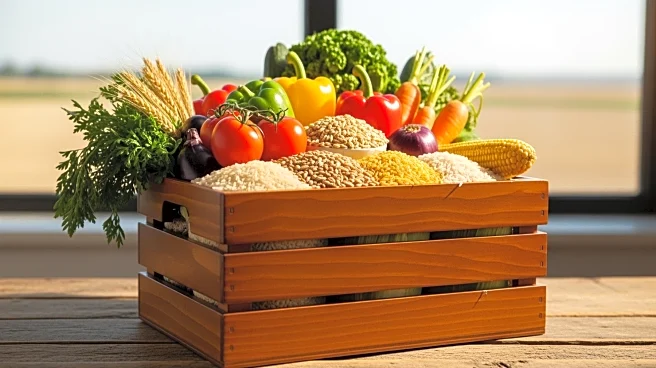What's Happening?
Canada is positioning itself as an agricultural and food superpower, with Prime Minister Mark Carney setting a goal to more than double exports to countries other than the United States by 2035. This ambitious plan involves increasing exports by $132
billion annually, focusing on agriculture, aquaculture, and value-added ingredients. The strategy aims to capitalize on Canada's strengths in producing high-quality crops like canola and pulses, while addressing geopolitical challenges and shifting towards more value-added processing domestically. The initiative is part of a broader economic strategy to diversify trade and enhance Canada's role in global food security.
Why It's Important?
Canada's strategy to expand its agricultural exports is crucial for diversifying its economy and reducing dependency on the U.S. market. By focusing on value-added processing, Canada can increase its economic output and create jobs, while mitigating risks associated with commodity trade. The plan aligns with global trends, as rising incomes in Asia and Africa drive demand for higher-quality food products. This presents a significant opportunity for Canada to leverage its agricultural capabilities and contribute to global food security, especially as climate change impacts food production in other regions.
What's Next?
To achieve its export goals, Canada will need to attract investment in food processing and innovation. The government is expected to introduce measures to support this, including tax incentives and investment programs. Stakeholders, including industry leaders and policymakers, will play a key role in implementing the strategy and ensuring its success. The focus will be on building infrastructure and scaling production capabilities to meet global demand, while navigating geopolitical challenges and fostering international partnerships.
Beyond the Headlines
Canada's agricultural strategy highlights the potential for climate change to impact food production positively in some regions, as warmer climates extend growing seasons. This could enhance Canada's agricultural output, positioning it as a key player in addressing global food security challenges. The strategy also underscores the importance of innovation and technology in transforming traditional industries, with potential long-term benefits for Canada's economy and global influence.
















